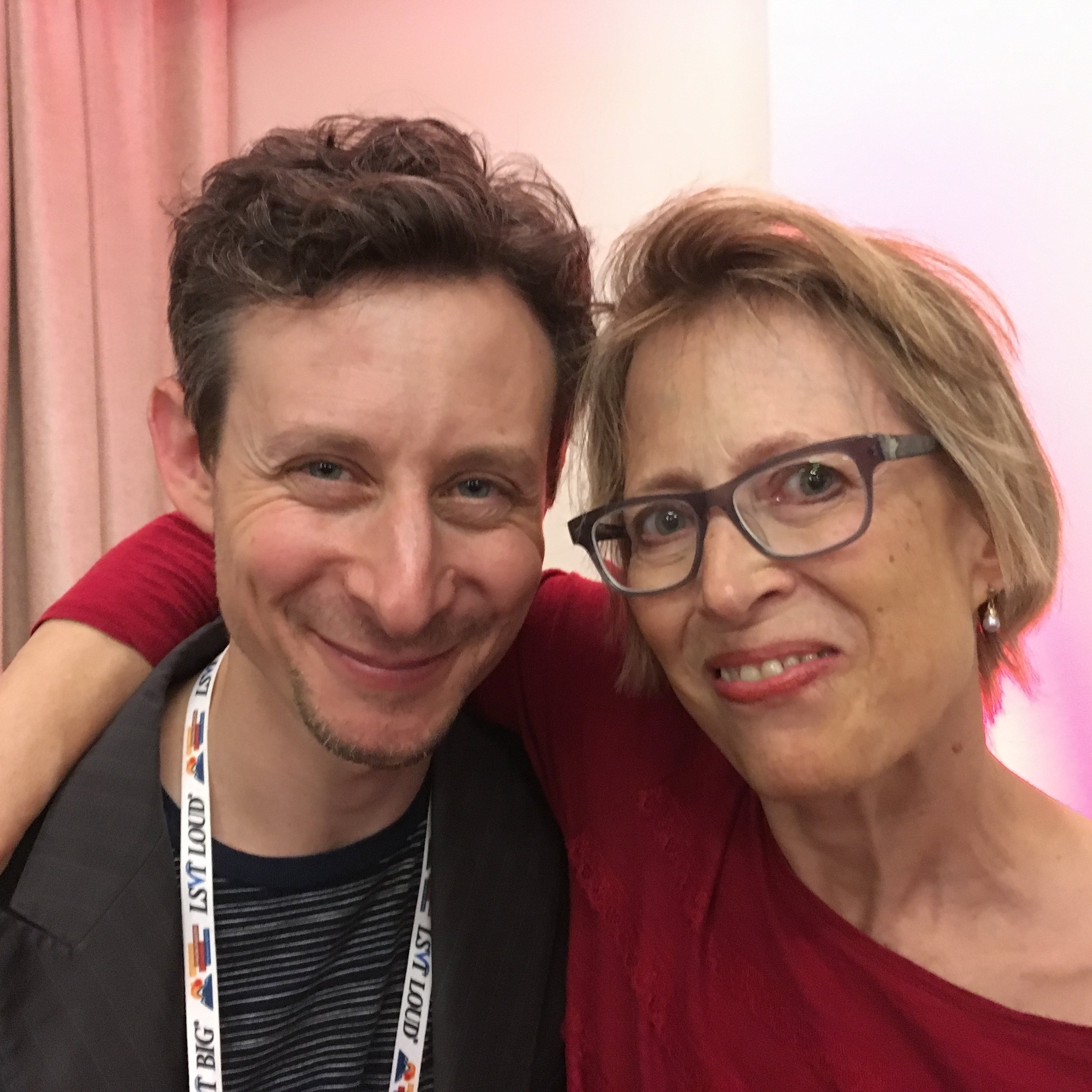My good friend and collaborator David Leventhal and me after a glass of wine. David was one of three recipients of the 2016 WPC Award for Distinguished Contribution to the Parkinson Community.
Dear Friends,
A few weeks ago I had the privilege to attend the 4th World Parkinson Congress in Portland, Oregon. To my knowledge, this is the most comprehensive gathering regarding PD in that it values the participation of ALL those affected by the disease – neurologists, patients, researchers, family, friends, even service dogs. The inclusive tone and format allows for cross-pollination and meaningful exchange, and I would personally like to thank Eli Pollard and all the sponsors for their support of that vision.
For those of you who were unable to attend, and for those of you who did attend but could not get to everything, here is a brief personal list--and undoubtedly incomplete--of some of my favorite moments
High Points:
- Watching Sara Riggare, the queen of QS, or quantified self, give her presentation. The quantified-self is a movement in the patient community that encourages you, the patient, to take charge of your own treatment by tracking your day-to-day habits as they relate to your condition. This might mean that you record the time of day each time your meds wear off or you write down what you did that day, each time you have trouble sleeping. The idea is that you can then take this information to your doctor and work to develop more precise and customizes treatment methods. Check Sara's blog here: http://quantifiedself.com/sara-riggare/
Tom Isaacs receiving the WPC Award for Distinguished Contribution to the Parkinson Community. Tom's bottom-up, patient data based approach to tackling Parkinson's Disease is spurring a reorientation of medical research and how scientists arrive at their hypotheses about the disease. Watch Tom explain this method more in-depth here: www.youtube.com/watch?v=Nb3DNv9jbF4
David Leventhal receiving the WPC Award for Distinguished Contribution to the Parkinson Community. David's work with Dance for PD has transformed the world's understanding of dance and the potential of its therapeutic offerings. Check out the Dance for PD website here: http://danceforparkinsons.org/
For the first time in WPC history there was a panel devoted to the subject of “Care vs. Cure”, that addressed how we should divide our resources between research to eradicate PD and programs that enhance the quality of life for those already afflicted. What do you think that distribution should be?
I am proud to say that this panel was inspired by a podcast Dave Iverson, Jon Palfreman, Sara Riggare, and I made leading up to the WPC. You check out our conversation at this link: https://www.podcat.com/podcasts/to0syS-portland-countdown-a-series-of-conversations-on-parkinson-s-disease-with-dave-iverson-jon-palfreman/episodes/CR3XL9-14-patient-perspectives
Areas for improvement:
Our attendees continue to underrepresent minorities. This is a problem the PD community has faced for years and has had great difficulty in changing. More effort and continued effort needs to be given to incorporating these valuable voices into the PD community.
Ideas for stage-specific treatment and care methods need to be further developed. Better engaging patient councils--like the ones at the MJ Fox Foundation and the new Parkinson's Foundation--would be a good step towards achieving this goal. It is the people living with the disease that have the most acute insights into the problems that they face and how medical practitioners might accordingly address these issues. The WPC would be the perfect venue to facilitate this kind of patient to nurse practitioner to doctor exchange.
To expand on the above point, patients and doctors, in general, have to figure out a way to better integrate ideas from lived patient experience into treatment strategies. We need to understand why certain Parkinson’s patients do well from a subjective level as well as from a scientific, objective level. We should start by asking:
What are the habits and mindsets of successful patients?
What have PWPs figured out about themselves that can be expanded to help others?
How can the answers to these questions be standardized in treatment procedures?
These are the insights, I believe, that have the potential to confront and attend to the immense diversity of the disease's manifestations in a more accurate and empathetic manner. When there is so much variation in the array of symptoms from patient to patient, and different rates of progression, why should we be looking for scientific results that apply to every PD patient? The WPC could be the leader in facilitating the conversation between scientific and subjective exchange - a PD osmosis of sorts.
Now you have read my thoughts. What were some your favorite moments? What do you think about what I have written above? Leave them in the comment section below.
Go ahead and share this post by email or social media if you like it!
Stay tuned for my next letter!
Pamela Quinn
To leave a comment, follow these three steps: 1) Write your comment in the text box below, and click the "Post Comment" button 2) A black screen will appear. Write your name or "Anonymous" in the first text box 3) Click the gray "Comment As Guest" button. Voila! Thanks for your thoughts!
For a detailed visual guide to posting a comment visit PD Movement Lab Comment Directions

